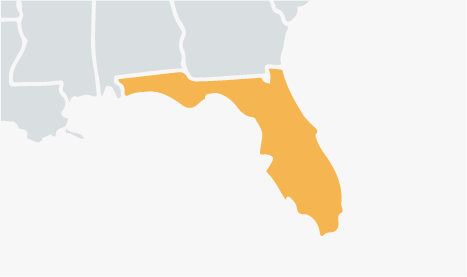| Subgrades | |
| Covered Speech: | C |
| Anti-SLAPP Procedures: | D- |
| Subscores | |
| Covered Speech: | 65 out of 100 points |
| Anti-SLAPP Procedures: | 21 out of 100 points |
| Detailed Scoring on Anti-SLAPP Procedures | |
| Suspension of Court Proceedings Upon an Anti-SLAPP Motion: | 5 of 20 points |
| Burden of Proof on Plaintiff to Defeat an Anti-SLAPP Motion: | 6 of 12 points |
| Right to an Immediate Appeal: | 0 of 25 points |
| Award of Costs and Attorney Fees: | 10 of 40 points |
| Expansive Statutory Interpretation Instruction to Courts: | 0 of 3 points |
State Anti-SLAPP Statute
Florida’s anti-SLAPP statute[1] protects (1) statements made before a governmental entity in connection with an issue under consideration or review by that entity and (2) statements made in or in connection with a “play, movie, television program, radio broadcast, audiovisual work, book, magazine article, musical work, news report, or other similar work.” The statute does not provide for the stay of discovery in the event of an anti-SLAPP filing, although the court must set a hearing on the motion as soon as practicable; the hearing must be set at the earliest possible time after the filing of the response to the motion. The statute does not describe any special standard of proof that the respondent must meet in order to defeat the anti-SLAPP motion, nor does it provide for an interlocutory appeal of an order granting or denying an anti-SLAPP motion.[2] The court must award costs and attorney fees to the prevailing party on an anti-SLAPP motion. Florida’s statute also affects the rights of litigants in actions between homeowners and homeowners’ associations in ways that are not central to this report.
How to Improve Florida’s Score
Florida’s law suffers from two fundamental flaws. The scope of speech protected is too narrow. The law also has weak statutory procedures to protect speakers facing weak or frivolous lawsuits.
It should consider adopting the Uniform Law Commission’s model law in its entirety. More information about UPEPA is available here.
[1] Fla. Stat. Ann. §§ 720.304, 768.295.
[2] Courts of Appeal in Florida are divided over whether the statute provides for a right to interlocutory appeal. Two decisions say that it does not: Vericker v. Powell, 343 So. 3d 1278 (Fla. Dist. Ct. App. 2022); Bosshardt v. Drotos, No. 1D21-3379 (Fla. Dist. Ct. App. Nov. 30, 2022). By contrast, one decision says that the “essential requirements of law” require interpreting the law as providing such a right. See Davis v. Mishiyev, No. 2D21-1726 (Fla. Dist. Ct. App. May. 11, 2022).












